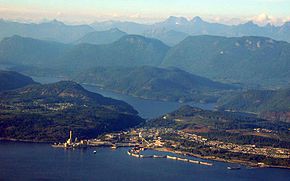
British Columbia is the westernmost province of Canada. Situated between the Pacific Ocean and the Rocky Mountains, the province has a diverse geography, with rugged landscapes that include rocky coastlines, sandy beaches, forests, lakes, mountains, inland deserts and grassy plains. British Columbia borders the province of Alberta to the east; the territories of Yukon and Northwest Territories to the north; the U.S. states of Washington, Idaho and Montana to the south, and Alaska to the northwest. With an estimated population of over 5.6 million as of 2024, it is Canada's third-most populous province. The capital of British Columbia is Victoria, while the province's largest city is Vancouver. Vancouver and its suburbs together make up the third-largest metropolitan area in Canada, with the 2021 census recording 2.6 million people in Metro Vancouver. British Columbia is Canada's third-largest province in terms of total area, after Quebec and Ontario.
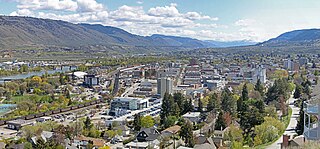
Kamloops is a city in south-central British Columbia, Canada, at the confluence of the North and South Thompson Rivers, which join to become the Thompson River in Kamloops, and east of Kamloops Lake. It is located in the Thompson-Nicola Regional District, whose district offices are based here. The surrounding region is sometimes referred to as the Thompson Country.

Vancouver Island University is a Canadian public university serving Vancouver Island and coastal British Columbia. Malaspina College began in 1969 and it has grown into a university which plays an important role in the educational, cultural, and economic life of the region. The main campus is located in Nanaimo; there are regional campuses in Duncan and Powell River as well as a centre in Parksville.

The following is an alphabetical list of articles related to the Canadian province of British Columbia.

Powell River is a city on the northern Sunshine Coast of southwestern British Columbia, Canada. Most of its population lives near the eastern shores of Malaspina Strait, which is part of the larger Georgia Strait between Vancouver Island and the Mainland. With two intervening long, steep-sided fjords inhibiting the construction of a contiguous road connection with Vancouver to the south, geographical surroundings explain Powell River's remoteness as a community, despite relative proximity to Vancouver and other populous areas of the BC Coast. The city is the location of the head office of the qathet Regional District.
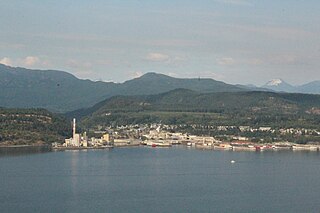
The qathet Regional District is a regional district in the Canadian province of British Columbia. Its only incorporated municipality is the City of Powell River, although it includes a number of unincorporated areas. The district encompasses a land area of 5,075.33 square kilometres (1,959.60 sq mi). The district was formerly known as the Powell River Regional District. Because of frequent confusion between the identical names of Powell River district and city, the district's name was changed in 2018 to qathet, from q̓at̓ᶿət, meaning "working together, bringing together" in the Comox language of the Tla'amin Nation.
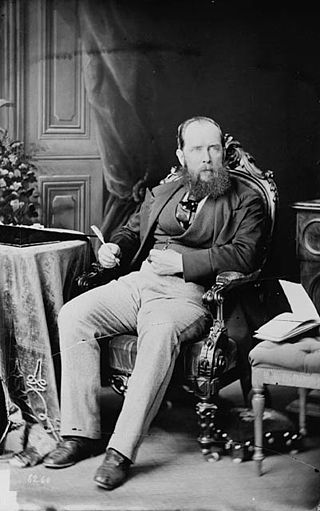
Sir Joseph William Trutch, was an English-born Canadian civil engineer, land surveyor, and politician who served as first Lieutenant Governor of British Columbia.
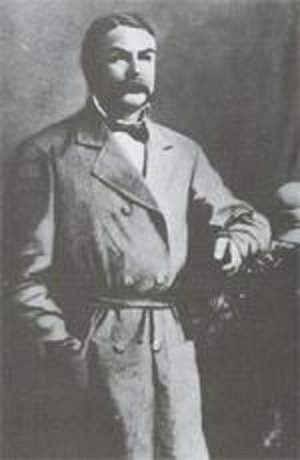
Gilbert Malcolm Sproat was a Scottish-born Canadian businessman, office holder, and author.
Tkʼemlúps te Secwépemc, abbreviated TteS and previously known as the Kamloops Indian Band, is a First Nations government within the Shuswap Nation Tribal Council, which represents ten of the seventeen Secwepemc band governments, all in the southern Central Interior region, spanning the Thompson and Shuswap districts. It is one of the largest of the 17 groups into which the Secwepemc (Shuswap) nation was divided when the Colony of British Columbia established an Indian reserve system in the 1860s.
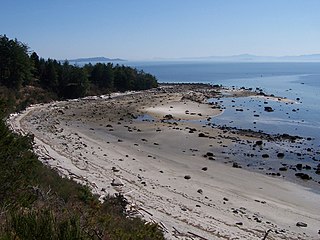
Savary Island or Áyhus is an island in British Columbia, Canada. Located in the northern part of the Strait of Georgia, it is 144 kilometres (89 mi) northwest of Vancouver. It is approximately 0.8-1.5 km wide and 7.5 kilometres (4.7 mi) long. It has a permanent population of about 100, expanding to perhaps 2,000 or more in the summer months. Savary Island lies within the traditional territory of the Tla'amin Nation.

Lax-Kwʼalaams, previously called Port Simpson until 1986, is an Indigenous village community in British Columbia, Canada, not far from the city of Prince Rupert. It is located on Port Simpson Indian Reserve No. 1, which is shared with other residential communities of the Tsimshian Nation. The Nine Allied Tribes are: Gilutsʼaaw, Ginadoiks, Ginaxangiik, Gispaxloʼots, Gitando, Gitlaan, Gitsʼiis, Gitwilgyoots, and Gitzaxłaał.

Lund is a small craft harbour and unincorporated village on Tla'amin land in qathet Regional District, British Columbia, Canada. It is along the northern part of the Salish Sea on the mainland BC coast. The main landmark in the village is the Lund Hotel, established in 1905. By boat from Lund, the Copeland Islands and Desolation Sound, are nearby. Lund is home to many shops and services including a general store, a restaurant overlooking the water, kayak and adventure tourism stores, and Nancy's Bakery, a favourite of locals and tourists.

The Kamloops Indian Residential School was part of the Canadian Indian residential school system. Located in Kamloops, British Columbia, it was once the largest residential school in Canada, with its enrolment peaking at 500 in the 1950s. The school was established in 1890 and operated until 1969, when it was taken over from the Catholic Church by the federal government to be used as a day school residence. It closed in 1978. The school building still stands today, and is located on the Tk’emlúps te Secwépemc First Nation.

The Powell River is a river in the northern Sunshine Coast region of British Columbia, Canada that flows a short distance through the eponymous city of Powell River, British Columbia to enter the Salish Sea. It is one of the shortest rivers in the world, measuring 500 Meters in length.
The Sisters of St. Anne (SSA) is a Catholic religious institute founded in 1850 in Vaudreuil, Quebec, Canada, by Marie Anne Blondin to promote the education of the rural children of the Province of Canada. Their vision is rooted and guided by Ignatian spirituality.
The Simpcw First Nation, formerly known as the North Thompson Indian Band, is a First Nations band government based in the Thompson Country of British Columbia, Canada. It is a member of the Shuswap Nation Tribal Council. It is a First Nations government of the Secwepemc (Shuswap) Nation, located in the Central Interior region of the Canadian province of British Columbia. The band's main community is at Chu Chua, British Columbia. Four of the five First Nation Reserves in Simpcw territory were designated on July 5, 1877 and the fifth was designated on February 24, 1916. The Shuswap language name for North Thompson Band's community and reserve is 'Simpcw'.

Powell Lake is a lake in the northern Sunshine Coast region of British Columbia, Canada, adjacent to the city of Powell River, which sits on the low rise of land forming a natural dam between the lake and the Strait of Georgia. The lake flows to the ocean through Powell River and features Goat Island, a large mountainous island. It serves as a reservoir for a small hydroelectric generating station which was built to serve the city's paper mill, and also as a water supply for that paper mill.
Elsie Paul is an Elder and knowledge keeper of the Tla'amin (Sliammon) Nation, located on the Sunshine Coast of British Columbia, Canada. Paul is a residential school survivor and one of the few living people to speak the Tla'amin language fluently. Paul holds an honorary Doctorate degree from the Vancouver Island University and has co-authored a book, Written as I Remember it: Teachings From the Life of a Sliammon Elder. This work was later released in an open access, multimedia, digital edition. Paul's traditional name is Qazustala's, which translates as, "a welcoming person with a wealth of knowledge, someone who shares her culture".

The Kuper Island Indian Residential School, also known as Kuper Island Indian Industrial School, was a Canadian Indian residential school located on Kuper Island, near Chemainus, British Columbia, that operated from 1889 to 1975. The school was operated by the Roman Catholic Church, with funding from the Department of Indian Affairs.
Alfred V. Waugh is an Indigenous architect based in British Columbia. Born in Yellowknife, Waugh studied Urban and Regional Studies as an undergraduate at the University of Lethbridge, and pursued a second bachelors degree in architecture at the University of British Columbia School of Architecture. Waugh founded Formline Architecture + Urbanism in 2005, an Indigenous-owned practice. He is best known for the design of the the Indian Residential School History, and Dialogue Centre at the University of British Columbia, designed alongside Manny Trinca and Vince Knudsen. Another notable project is the First Peoples House at the University of Victoria, which he designed in collaboration with Kenneth Wong.

